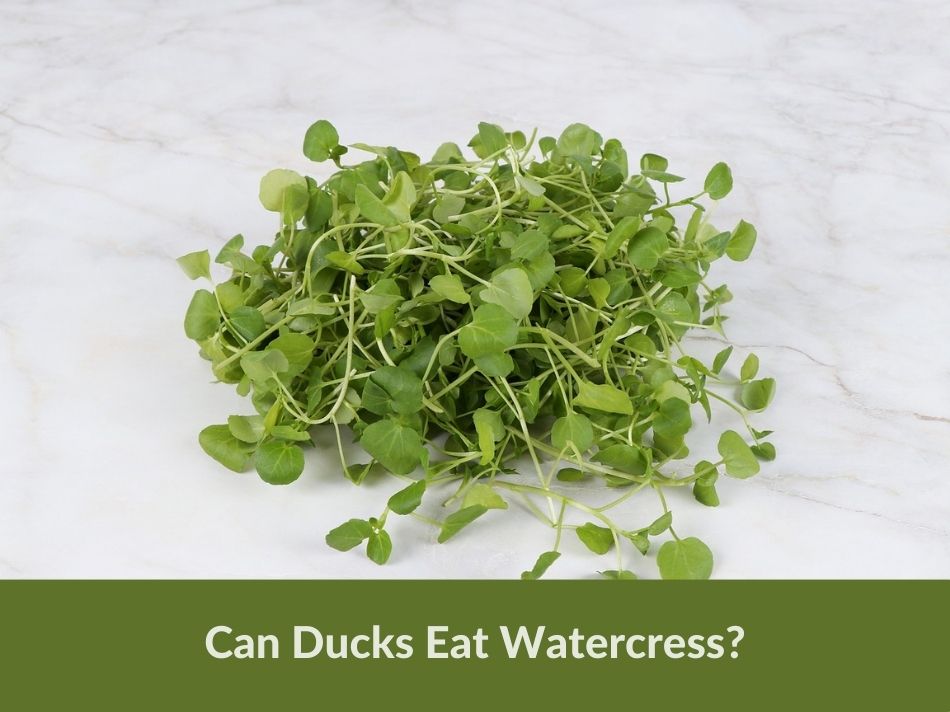Ducks are omnivorous birds that have a wide-ranging diet including grains, seeds, aquatic plants, insects, and small fish. While domestic ducks often eat pellets, grains and vegetables. But, can ducks eat watercress?
Yes, ducks can eat watercress. In fact, watercress offers ducks a nutritious boost packed with essential vitamins and minerals such as Vitamin A, Vitamin C, and calcium.
In this article, you’ll discover the ins and outs of feeding watercress to ducks. Covering everything from the general diet of ducks to the specific benefits and considerations of adding watercress to their meals.
How Often Can I Feed My Ducks Watercress?
Watercress can be fed to ducks a few times a week as part of a varied diet. Like us humans, ducks benefit from dietary variety, not only for nutritional balance but also for behavioral enrichment. A good rule of thumb is that treats should not exceed 10% of the duck’s diet.
Can Ducklings Eat Watercress?
Ducklings can also consume watercress, but it should be introduced slowly and in small amounts, particularly if they are not used to eating greens. Make sure to finely chop the watercress to make it easier for them to consume and digest. Always make sure that have access to fresh water.
Watercress Nutritional Value
Below is the nutritional value of 100 grams of watercress.
- Calories: 11 kcal
- Protein: 2.3 g
- Carbohydrates: 1.3 g
It also contains several vitamins and minerals as listed below.
- Vitamin A
- Vitamin C
- Vitamin K
- Calcium
- Manganese
Are Watercress Healthy for Ducks?
Watercress is rich in vital nutrients that are beneficial for ducks. The Vitamin A present supports good vision and immunity, the Vitamin C can be particularly useful for ducks living in stressful environments, and calcium is especially crucial for laying ducks.
Additionally, watercress has fiber that aids in digestion. So, it’s not just a treat but also a health-boosting food item.
- Vitamin A: Essential for good vision and immunity in ducks, a deficiency can result in poor vision and increased susceptibility to diseases.
- Vitamin C: Though ducks naturally produce Vitamin C, extra amounts can support them in stressful situations. It serves as an antioxidant and aids in tissue repair.
- Vitamin K: This vitamin is crucial for blood clotting and bone metabolism, helping ducks heal quickly from wounds.
- Calcium: Particularly important for laying ducks, Calcium is required for strong eggshells and overall bone health.
- Manganese: Manganese aids in bone formation and blood clotting, and a deficiency can result in skeletal deformities and weak eggshells.
How To Feed Watercress To Ducks
- Source Quality Watercress: Make sure the watercress is fresh and free from pesticides or chemicals.
- Wash Thoroughly: Rinse the watercress leaves under clean running water to remove any contaminants.
- Portion Size: A handful of watercress is generally sufficient for a small flock; adjust the amount based on flock size.
- Preparation for Ducklings: If feeding ducklings, chop the watercress into smaller pieces for easier consumption.
- Scatter or Float: Either scatter the leaves on the ground or float them on water to encourage natural foraging behavior.
- Provide Clean Water: Always have clean water available, especially when introducing new foods like watercress.
More Vegetables Ducks Can Eat
Besides watercress, there are numerous other vegetables that ducks can safely consume. These vegetables not only add variety to a duck’s diet but also contribute vital nutrients that support their health.
Conclusion
Whether you’re a duck caretaker or a park visitor, adding watercress to a duck’s diet can be a wonderful way to offer them a nutritious snack. However, moderation is key, and it’s essential to balance out their diet with other food items as well. Ducklings can also partake, but remember to chop the watercress finely and introduce it gradually.
So, the next time you find yourself pondering what to feed these feathered friends, consider watercress as a healthy, nutritious option. Just don’t forget to give them some water along with it!
Disclaimer: The information in this article is for informational purposes only. I'm not an expert or a veterinarian.


